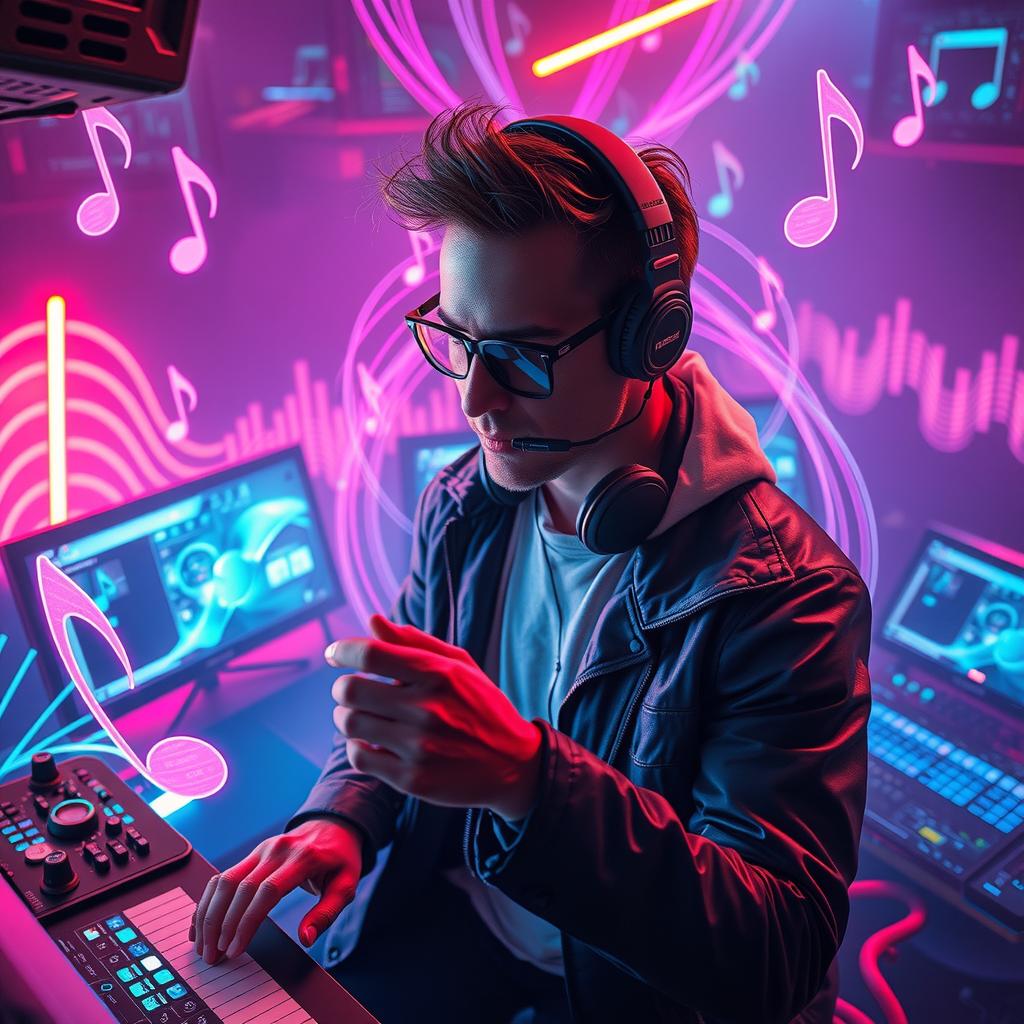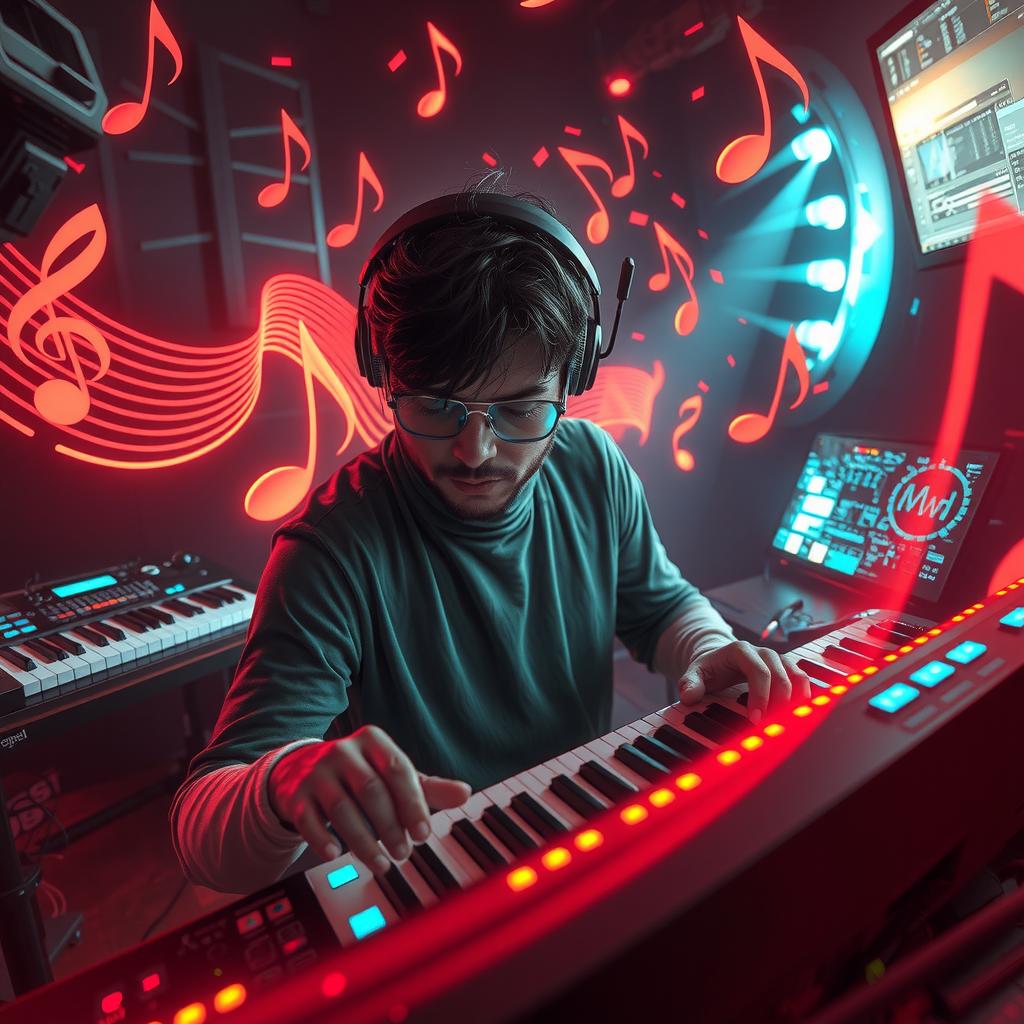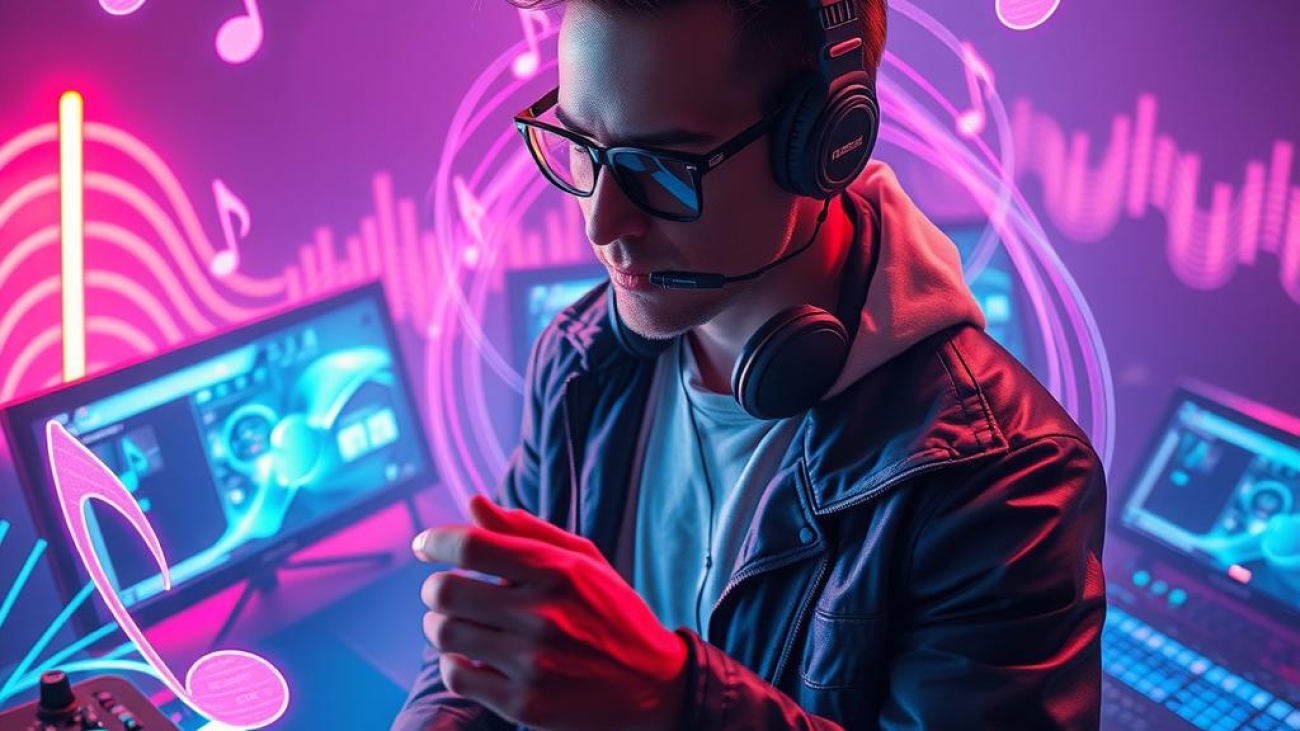In the fast-evolving landscape of video game development, one of the most crucial yet often overlooked components is the soundtrack. As games become more immersive and complex, traditional methods of soundtrack creation struggle to keep pace with players’ expectations for adaptive and dynamic audio experiences. The challenge lies not only in creating compelling melodies but also in ensuring that these compositions seamlessly react to gameplay elements—an expectation that continues to rise among gamers. Enter AI-Powered Music Composition, a groundbreaking approach that harnesses advanced algorithms and machine learning techniques to revolutionize music generation for video game soundtracks.
The core value of incorporating AI into gaming extends far beyond mere convenience; it opens up new avenues for creativity and interactivity in sound design. With automated music production capabilities, developers can now create rich, layered soundscapes tailored specifically to enhance player engagement without being constrained by time or budget limitations. This technology allows for real-time adaptations based on player actions or environmental changes within the game world, delivering an unprecedented level of immersion through personalized auditory experiences.
Moreover, as studios explore innovative solutions like AI-Powered Music Composition, they find themselves equipped with tools capable of producing high-quality tracks at an astonishing speed—essentially providing endless possibilities for soundtrack creation. By utilizing adaptive music solutions powered by artificial intelligence, creators can concentrate on refining their narratives while leaving the complexities of composition to intelligent systems designed explicitly for this purpose.
As we delve deeper into this fascinating intersection between technology and artistry, it becomes evident how AI in gaming is shaping not only the future of video game soundtracks but also redefining what players can expect from their interactive experiences. Join us as we explore how AI-driven platforms are transforming music generation processes in gaming—from initial concept sketches through final implementation—and discover why embracing this technological shift could be key to unlocking richer sonic landscapes in future titles.

Key Points:
-
Transformative Role of AI in Music Creation: The integration of AI-Powered Music Composition heralds a new era for video game soundtracks, transforming how music is created and experienced. By leveraging advanced algorithms, developers can generate intricate scores that dynamically adjust to player actions and emotional narratives.
-
Real-Time Adaptation for Enhanced Gameplay: Utilizing the capabilities of AI in gaming, this innovative approach facilitates real-time adaptations in music generation. As players navigate through various scenarios, the soundtrack evolves accordingly, creating an immersive atmosphere that heightens engagement and enhances gameplay experiences.
-
Empowering Creators with Interactive Sound Design: With tools like AI-Powered Music Composition, creators are empowered to explore interactive sound design more easily. This technology allows composers to experiment with diverse styles and genres efficiently, making adaptive music solutions not only feasible but integral for modern game development teams aiming to push creative boundaries.

The Early Days of Video Game Music
From Beeps to Melodies: A Journey Through Time
In the early days of video gaming, music was often limited to simple beeps and boops produced by primitive sound chips. Games such as Pong and Space Invaders utilized minimalistic audio that served more as a functional cue than an artistic expression. As technology advanced, developers began incorporating richer melodies into their games, leading to iconic soundtracks in titles like Super Mario Bros. and The Legend of Zelda. These tunes not only enhanced gameplay but also became memorable motifs that players associated with their experiences. This era marked the transition from static scores—where a set piece played on loop—to more dynamic compositions that adapted slightly based on player actions or game states. However, even these early attempts at interactive music were rudimentary compared to what would eventually emerge.
The Golden Age: Expanding Horizons
Embracing Complexity in Sound Design
The 16-bit era introduced significant advancements in both hardware capabilities and compositional techniques for video game soundtracks. Titles such as Final Fantasy VI showcased orchestrated pieces that transcended previous limitations, allowing for emotional storytelling through music. Composers began experimenting with layering sounds and creating thematic motifs tailored specifically for characters or story arcs. As gaming systems evolved into CD-based formats, full orchestral scores became possible; composers like Nobuo Uematsu pushed boundaries further by integrating complex arrangements into games’ narratives. During this time, the concept of AI-Powered Music Composition started gaining traction among forward-thinking developers who saw potential in automated music production tools capable of generating unique tracks based on predefined parameters.
The Rise of Adaptive Music Solutions
Crafting Unique Experiences Through Technology
As gaming entered the 21st century, there was a burgeoning need for adaptive solutions in soundtrack creation due to increasingly sophisticated gameplay mechanics requiring real-time responses from audio elements. This led many studios to explore AI in gaming, resulting in revolutionary approaches where backgrounds could shift dynamically according to player decisions or environmental changes within virtual worlds. For instance, games like The Last of Us Part II effectively employ adaptive music solutions alongside intricate narrative structures—crafting emotionally charged moments supported by fluidly changing auditory landscapes shaped through intelligent algorithms instead of pre-recorded loops alone.
With advancements such as AI-driven platforms enabling automated music production processes, independent developers now have unprecedented access to compositional resources previously reserved for larger studios with extensive budgets or teams dedicated exclusively towards soundtrack development efforts—a true democratization within creative realms! Consequently individuals can harness music generation technologies powered by artificial intelligence not only streamline workflows but also enhance overall engagement levels experienced during gameplay sessions ultimately reshaping how audiences connect emotionally with their favorite titles while simultaneously providing varied listening experiences tailored uniquely per playthrough session!
Looking Ahead: Future Trends
Envisioning Tomorrow’s Gaming Landscapes
As we look towards future innovations within interactive entertainment spaces—including virtual reality (VR) environments—the role played by dynamic soundtracks will undoubtedly expand further still thanks largely due technological integrations observed today utilizing state-of-the-art methodologies grounded upon principles seen throughout history regarding evolution concerning video game scoring practices over decades past! Thus it becomes imperative players recognize transformative power presented via contemporary developments surrounding topics related directly linked back toward concepts initially explored earlier namely those highlighted here emphasizing importance placed upon thoughtfully crafted compositions woven intricately together harmonizing beautifully alongside visual narratives designed captivate audiences across diverse genres ensuring lasting impacts felt long after credits roll finale unfolds wrapping up adventure undertaken amongst beloved friends found inhabiting digital realms created solely intention provide joy exploration discovery excitement fun-filled challenges await each turn taken journey embarked upon amidst ever-changing landscapes crafted lovingly artisans dedicated bringing dreams life unmistakably offering something truly special every moment savored along way!
The Future of Soundtrack Creation
Harnessing AI for Enhanced Player Experiences
The introduction of AI-Powered Music Composition is revolutionizing the landscape of soundtrack creation, particularly in the realm of video games. This cutting-edge technology offers unparalleled opportunities for music generation that enhances creativity while significantly improving efficiency. By analyzing player behavior and environmental context, AI can craft adaptive music solutions that evolve dynamically with gameplay. For instance, when a player enters a combat scenario, the system can seamlessly transition to a more intense score to heighten tension and engagement. In this way, AI in gaming not only tailors soundtracks to individual experiences but also creates deeply immersive environments where players feel more connected to their journey.
Transforming Creative Processes
With traditional methods of composing video game soundtracks often involving lengthy processes and substantial resources, AI-Powered Music Composition provides an innovative alternative by automating music production. Composers can now harness this technology to generate multiple variations on thematic material within moments—an endeavor that would typically take hours or even days through manual composition techniques. This shift allows artists greater freedom; they are no longer bogged down by repetitive tasks and can focus on refining their creative visions. Additionally, as automated music production tools become more sophisticated, they offer unique features such as mood recognition and style adaptation based on user feedback—making it possible for developers to produce high-quality interactive sound design without sacrificing artistic integrity.
Empowering Developers with Adaptive Solutions
One significant aspect of integrating AI-Powered Music Composition into gaming is its ability to foster collaboration between musicians and developers. By utilizing intelligent algorithms capable of generating tailored scores quickly, teams can experiment with various musical styles during development stages without incurring prohibitive costs or time delays associated with traditional scoring sessions. For example, studios may employ generative techniques that allow them to test different emotional responses within their audience effectively; what resonates best becomes evident through real-time analytics provided by these advanced systems. Ultimately, this empowers creators beyond conventional boundaries—turning potential obstacles into stepping stones toward groundbreaking projects.
A New Era in Immersive Gameplay
As we witness the rapid evolution brought forth by AI-Powered Music Composition, it’s clear that the future holds incredible promise for both gamers and creators alike. The impact goes well beyond mere background melodies; we’re talking about fully personalized audio landscapes designed specifically around each player’s experience—a feat made possible through innovative adaptive music solutions driven by artificial intelligence capabilities today! As we embrace these advancements in soundtracking methodologies within our favorite titles—from AAA blockbusters down to indie gems—it is essential for all involved parties—the composers who write them alongside those who play—to recognize how instrumental such technologies will be moving forward towards ever-more captivating worlds brimming with life!
The Evolution of Game Soundtracks
Unlocking New Dimensions in Interactive Music
In the ever-evolving landscape of video game development, AI-Powered Music Composition is poised to drastically change how soundtracks are created and experienced. Traditionally, composing music for games has been a labor-intensive process that often requires extensive collaboration between composers and developers. However, with advancements in machine learning and music generation technologies, developers can now harness AI to create dynamic soundscapes that adapt to gameplay in real-time. This evolution allows for an unprecedented level of interactivity within video game soundtracks, where players’ actions influence musical elements such as tempo, instrumentation, and harmony.
One significant advantage of utilizing AI music composition lies in its ability to generate vast libraries of unique audio snippets tailored specifically for different gaming scenarios. This automated music production not only reduces the time spent on soundtrack creation but also enhances the overall player experience by ensuring that no two playthroughs feel identical from an auditory perspective. For instance, adaptive music solutions can seamlessly transition based on player choices or milestones within the game—creating emotional peaks during pivotal battles or serene atmospheres during exploration phases.
Moreover, incorporating interactive sound design through AI-driven tools enables developers to experiment with innovative approaches previously unfeasible due to resource constraints. By leveraging sophisticated algorithms capable of analyzing gameplay data and user preferences, creators can produce personalized soundtracks that resonate deeply with individual players’ experiences. As a result, every interaction becomes enriched with contextually relevant audio cues crafted through intelligent analysis rather than static compositions looping indefinitely.
The implications extend beyond mere entertainment; they hint at future developments where AI-Powered Music Composition could redefine storytelling techniques within games themselves. By allowing narratives to unfold alongside evolving musical scores dynamically shaped by player actions or decisions—developers gain a powerful medium for conveying emotion and enhancing engagement levels far more effectively than traditional methods allow.
As machine learning continues refining its capabilities in generating complex auditory landscapes rooted firmly in gaming mechanics—a new frontier awaits both creators and gamers alike: one where immersive experiences are elevated through intelligent design choices made possible only via cutting-edge technology like automated music production systems focused on interactive environments.
In conclusion, embracing AI innovations will undeniably lead the charge toward revolutionizing how we perceive video game soundtracks today while setting standards higher than ever before regarding creativity potential across platforms globally.
Frequently Asked Questions:
Q: How does AI-Powered Music Composition enhance video game soundtracks?
A: The integration of AI-Powered Music Composition allows developers to create dynamic and responsive soundtracks that adapt in real-time to player actions and narrative developments. By employing advanced algorithms, this technology analyzes various elements within the game, enabling a more immersive musical experience tailored specifically to enhance gameplay.
Q: What benefits do adaptive music solutions offer for soundtrack creation?
A: Adaptive music solutions, facilitated by AI in gaming, provide developers with the ability to produce intricate and evolving scores without the extensive time commitment typically associated with traditional composition methods. This innovation not only streamlines music generation but also encourages creative experimentation across different genres, ultimately leading to richer audio experiences in video games.
Q: Can automated music production replace human composers?
A: While automated music production through tools like AI-Powered Music Composition significantly enhances efficiency and creativity, it is not intended to completely replace human composers. Instead, it complements their work by offering new avenues for exploration within soundtrack creation. The collaboration between AI technologies and human artistry can lead to groundbreaking compositions that elevate storytelling in gaming.
